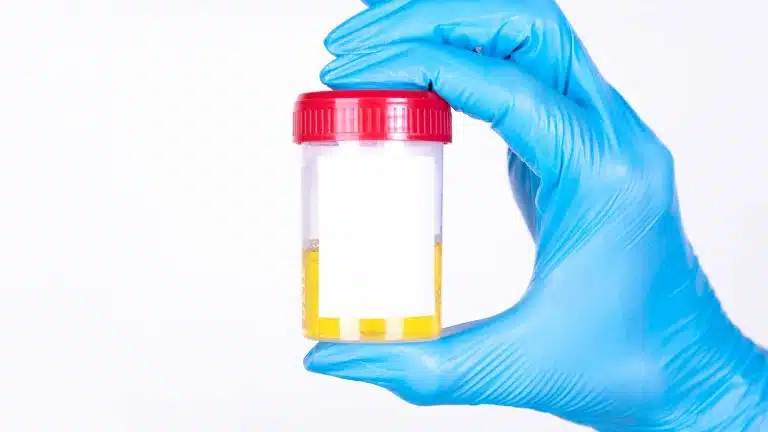EtG Alcohol Testing | Facts & Myths About Ethyl Glucuronide Testing

An EtG test is a type of alcohol testing that determines if you’ve had alcohol in your body recently. EtG stands for ethyl glucuronide, a metabolite that’s produced by your liver when it breaks down ethanol (also called ethyl alcohol—the kind you drink).
EtG testing is used to monitor alcohol abstinence in a variety of situations, such as court cases, DUI probation, and alcohol rehab programs.
You may have misconceptions about what an EtG test is and how it works. Here are some common facts and myths about EtG testing.
Facts About EtG Alcohol Testing
These are the basics of EtG testing—from how testing is done to how accurate it is and how it can help you stay sober.
An EtG Test Tells If You’ve Been Drinking In The Last Five Days
An EtG test is most accurate within two days of drinking. But it can detect alcohol for up to five days if you were drinking heavily.
Cutoff levels are set to determine what qualifies as a significant amount of alcohol for a positive result. A cutoff level of 100 ng/mL can detect alcohol consumption for longer than a cutoff level of 500 ng/mL.
An EtG Test Is Done With A Urine Sample
An EtG alcohol test is a urine or hair test. EtG stays in the urine much longer than in blood or oral fluid. The window of detection for a blood or saliva test is only a few hours, so a urine test is the most accurate choice with several days’ detection time.
You Can Get A False Positive On An EtG Test
Household products containing alcohol can cause a false positive EtG test. These include:
- cold medicines
- mouthwash
- antiperspirant
- hand sanitizer
- cleaning products
If you have a test coming up, try to avoid anything containing alcohol to get the most accurate result. Some EtG tests have higher cutoff levels to account for this risk.
Diabetics are also at risk of a false-positive result on an EtG alcohol test. If a diabetic gets a urinary tract infection (UTI) and they don’t monitor their sugar levels carefully, they may end up with glucose in their urine. The glucose ferments into alcohol and then breaks down into EtG.
You Can Get A False Negative On An EtG Test
If your urine sample isn’t stored properly, the EtG can break down, which may lead to a negative result. This typically occurs if the sample is left at room temperature for three days or more. Refrigeration can extend the viability of a urine sample for an EtG alcohol test.
EtG Tests Can Help You Maintain Sobriety
EtG tests are used to monitor alcohol abstinence. Alcohol rehab programs may use them to keep you accountable. If you want to stop drinking, having a regular EtG alcohol test can help you maintain sobriety, as they make it difficult to hide alcohol use.
Myths About EtG Alcohol Testing
Some people think that an EtG test is similar to a breathalyzer, but it is not. Here are a few common myths about EtG alcohol testing.
An EtG Test Detects Alcohol
EtG tests don’t detect alcohol, they detect ethyl glucuronide. If you’ve just had an alcoholic beverage and your liver hasn’t had time to break it down into EtG, the test will be negative (unless you’ve had other alcohol recently).
Your liver may take longer than someone else’s to convert alcohol to ethyl glucuronide. Or it might happen more quickly. This factor can affect testing accuracy.
An EtG Test Can Tell If You’re Drunk
Since an EtG test looks for a metabolite of alcohol, it won’t be positive if you take it right after drinking. A breathalyzer is a better measure of drunkenness.
For a breathalyzer test, you breathe into an electronic device that analyzes your oral fluid and estimates your blood alcohol content (BAC). Since alcohol doesn’t stay in saliva for more than a few hours, an EtG test and a breathalyzer serve different purposes.
An EtG Test Can Tell How Much You Drank
Not exactly. Generally, an EtG test can detect a higher amount of ethyl glucuronide for a longer period of time with heavy drinking. With light drinking, you may get a negative result after a couple of days.
An EtG test cannot tell what you were drinking or how many drinks you had.
Your EtG levels depend on more than just your alcohol intake. Age, body mass, hydration level, and metabolism speed can affect how your body breaks down alcohol and the amount of EtG that’s detectable.
What To Do If You Have A Positive EtG Test
If you have a positive EtG test due to incidental exposure to alcohol, you may be able to retake the test. Several days of avoiding household products that contain alcohol should result in a negative EtG alcohol test result.
But if you can’t stop drinking alcoholic beverages long enough to have a negative EtG test, it’s time to ask for help for alcohol abuse.
At Ark Behavioral Health, we offer compassionate care for alcohol use disorders. Our treatment programs are comprehensive and individualized so you get the support you need to heal. Reach out to us today to learn more.
Written by Ark Behavioral Health Editorial Team
©2024 Ark National Holdings, LLC. | All Rights Reserved.
This page does not provide medical advice.
Medical University of South Carolina - About Urine Ethylglucuronide (EtG) Testing
National Center for Biotechnology Information - Using Ethyl Glucuronide in Urine to Detect Light and Heavy Drinking in Alcohol Dependent Outpatients
ScienceDirect - Ethyl Glucuronide - an overview

Questions About Treatment?
Ark Behavioral Health offers 100% confidential substance abuse assessment and treatment placement tailored to your individual needs. Achieve long-term recovery.
100% confidential. We respect your privacy.
Prefer Texting?
Our friendly support team is here to chat 24/7. Opt out any time.







 Learn More
Learn More








